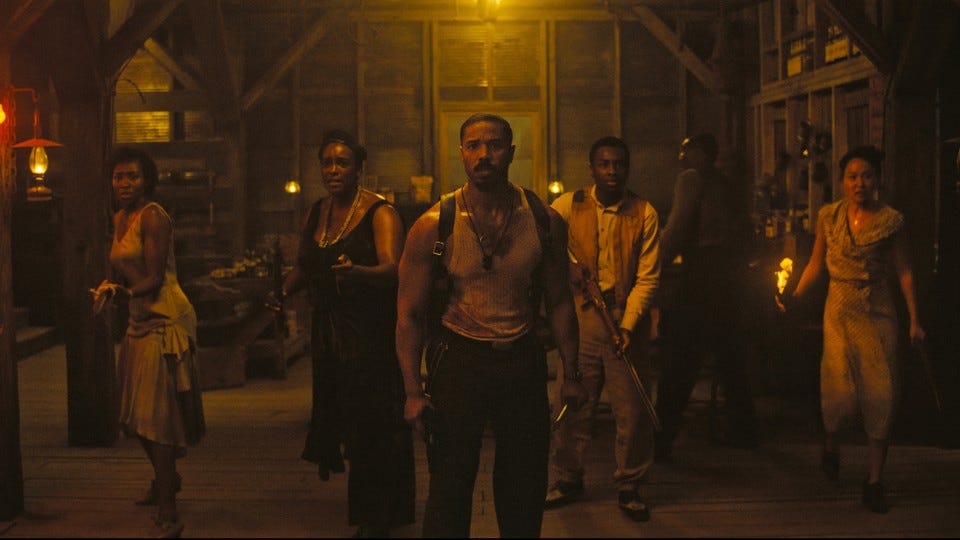Quick note before getting into it: Sinners is Rated R. There’s violence, sex, and blood. I’m not recommending it or warning you away. That’s your call1
Seeing Sinners
I saw it at Union Square with a couple of friends I know from church.
We didn’t have a lot to say right away. The film gives you a lot to sit with — vampires, yes, but also the Black church, Southern folklore, blues music, and how all of that gets mixed together into something that mostly works.
Ryan Coogler has always layered his stories. He grew up Baptist, went to Catholic school, and also went to movies all the time as as kid. You can feel both of those shaping the way this movie treats religion — not with full endorsement, but not dismissively either. It feels like someone who grew up in the church, moved slightly away, but still respects the power of the language and the structure.
The Premise
The story centers on “Preacher Boy,” a talented blues guitarist torn between the church where his father pastors and a new juke joint opened by two gangster brothers, Smoke and Stack, who’ve just returned home with suspicious cash and dreams of reinventing the town’s nightlife.
It’s framed as a choice between sacred and secular, between Sunday morning and Saturday night. But the history of gospel and blues (especially in the Black tradition) knows that line has always been blurred.
That’s part of the tension. Not everything is either/or.
The juke joint becomes a gathering space — not just for music and dancing, but for cultural exchange. White bluegrass players show up, drawn to the soulfulness of Preacher Boy’s sound, and to the older bluesman, Delta Slim.
Then the vampires arrive.
The vampires are there yes for a bit of horror, but also to make a point about exploitation. These aren’t just literal bloodsuckers. They’re stand-ins for a long legacy of artistic appropriation. They don’t just bite people. They feed on the culture. They take the life out of it.
Blood and Baptism
There’s a moment where Preacher Boy quotes 1 Corinthians 10:13:
“No temptation has overtaken you except what is common to mankind... when you are tempted, he will also provide a way out so that you can endure it.”
And he does find a way out — but it’s not through faith in God, or returning to the church. It’s by turning to his guitar. In the end, he uses it to defeat one of the vampires in a scene that looks a lot like a baptism. Not the kind you’d find in a Sunday service, but the symbolism is there.
That scene stuck with me. The music becomes his salvation.
What’s missing, though, is the power of the cross. Or any real Christ figure. The film uses Christian references, but doesn’t do as much with them as even other vampire movies. I kept waiting for holy water, or even just the visual of a cross driving back darkness. But that doesn’t happen. It’s more gesture than theology.
Who Are the Sinners?
So that’s in the title…
Is it Preacher Boy, who’s caught in an affair and runs from both church and family?
Is it Smoke, who takes justice into his own hands?
Is it their father, the preacher, who sees blues music as inherently sinful and leaves no room for creativity or beauty in the faith?
Or is it the white vampires, who offer promises of community and immortality, only to drain what’s not theirs?
It’s a trick question, of course, we are all sinners (Romans 3:23).
Even Stack, who at first seems adrift, ends up in what the movie treats as a kind of redemptive relationship — he chooses to become a vampire with his girlfriend, and they commit to each other. It’s strange. But it has a kind of integrity to it.
The ending shifts focus again. Smoke turns into a demon slayer gangster of sorts, going after a group of white supremacists who want to reclaim the juke joint. Their sin is for control and ownership. The film makes a clear distinction between blood taken for survival and blood taken for power.
I read a James Baldwin essay recently and this quote from Stranger in the Village felt especially relevant here:
“The white man’s motive was the protection of his identity; the black man was motivated by the need to establish an identity.”
Identity isn’t just about what you do, but what you create — and who gets to take it, twist it, or profit from it. The vampires in Sinners are doing more than attacking people. They’re draining meaning.
Sinners is a strange film, but admirable in a lot of ways. Part vampire flick, part Southern noir, part meditation on music, memory, and sin. It doesn’t all land. But it’s trying to say something.
Reviews and articles on “Sinners”
As a Christian, there are plenty of shows or movies I’ve tried watching because people were talking about them, but I didn’t stick with them. White Lotus was one — I made it most of the way through season one, then realized whatever it wanted me to think about, I’d rather not be mentally involved in that world.
You don’t need to avoid art, but not everything needs a stamp of approval either. You can engage with something critically without giving it a free pass. That’s where I’m coming from.




